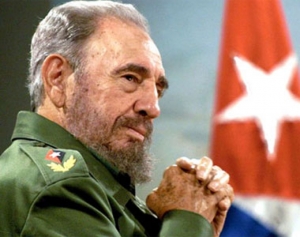 It is with a sense of deep sadness that the Workers’ Party of Ireland has learned of the death of Comrade Fidel Castro, former President of Cuba and Commander-in-Chief of the Cuban Revolution.
It is with a sense of deep sadness that the Workers’ Party of Ireland has learned of the death of Comrade Fidel Castro, former President of Cuba and Commander-in-Chief of the Cuban Revolution.
Fidel Alejandro Castro Ruz was President of Cuba for forty nine years. After commanding the revolution which overthrew the dictator, Fulgencio Batista, in 1959, he held the title of Prime Minister until 1976 when he became President of the Council of State and the Council of Ministers. He became First Secretary of the Communist Party of Cuba in 1965 and led the transformation of Cuba into a revolutionary socialist republic. As President, Comrade Fidel held the position of Commandante of the Cuban military. After a period of ill health he resigned as President in February 2008.
Prior to the revolution Cuba was effectively a U.S. colony, one of the many countries in Central America and the Caribbean where defiance of the US was unthinkable. Then, on 1st January 1959 the Cuban revolutionary forces, led by Fidel Castro, Ernesto “Che” Guevara, Camilo Cienfuegos and others entered Havana and Santiago.
The Cuban transition to socialism was rapid and extraordinary, establishing the sovereignty of the people over the land and its resources.By the end of the 1960s the new government had overhauled Cuban society in the interests of its people. Large industries and services were nationalised. Agrarian reform was introduced in which land was no longer a commodity and land speculation was abolished. These measures dealt an immense blow to imperialism and the capitalist class. The Cuban government introduced an exceptionally effective literacy campaign and the introduction of free public education at all levels. Free universal health care was introduced.
At a time when U.S. hegemony predominated in the region and when progressive movements in Mexico, Nicaragua and Guatemala had been crushed, the Cuban Revolution became a beacon of hope throughout the continent and the world. When Fidel Castro visited Venezuela in January 1959 he was greet by overjoyed masses of people and Salvadore Allende, then a Chilean Senator, stated: “The Cuban Revolution does not belong only to you … we are dealing with the most significant movement ever to have occurred in the Americas.”
Within months of the revolution the CIA began to arm terrorists and saboteurs inside Cuba. There was CIA-supervised bombing and incendiary raids piloted by Cubans based in the U.S. who were hostile to progress. In March 1960 Eisenhower called for the overthrow of Fidel Castro in favour of a regime “more devoted to the true interests of the Cuban people and more acceptable to the U.S.“, supporting “military operation on the island” and “development of an adequate paramilitary force outside of Cuba.” U.S. Intelligence reported that popular support for Castro was high, but the U.S. would determine the “true interests of the Cuban people.”
In 1961,in addition to overt and covert terrorist attacks, Kennedy implemented a crushing embargo that effectively barred even food and medicine. The U.S. blockade against Cuba was strengthened over the decades and is the most enduring blockade in history. The punitive U.S. economic, commercial and financial sanctions against Cuba remain in place.
The Cuban people, under the revolutionary leadership of Comrade Fidel Castro, resisted through the decades, all counter-revolutionary measures, paramilitary operations, clandestine subversion, attacks on agriculture, economic warfare involving the use of every possible device to weaken the economic life of Cuba, sabotage,assassination attempts against Fidel and the Bay of Pigs invasion in April 1961. The U.S. and its allies had underestimated the strength of the Cuban Revolution and the resolve of the Cuban people, through their Communist Party, popular militia and revolutionary mass organisations, to defend their revolution.
The Cuban Revolution defied all imperialist attempts at intervention and continued to construct a socialist society under the leadership of Fidel and the Communist Party of Cuba. We have witnessed the many achievements of the Cuban Revolution and the great social benefits to the Cuban people.
Fidel also understood the true nature of socialist internationalism, a solidarity based not on mere words or self-interest but on a genuine ideological commitment to the international communist movement, to the anti-imperialist struggles of all those working to transform the world. From its sustained practical assistance and support for liberation struggles which included the fight against apartheid in South Africa and the provision of vital military assistance in Angola which involved real sacrifices and which dealt a decisive defeat on the military forces of the apartheid regime in South Africa, socialist Cuba, despite being a small country faced with an economic blockade, has, as part of its extraordinary achievements,constructed a global programme of extensive development aid and humanitarian assistance and has sent thousands of teachers, doctors and medical staff across the world.
The death of Fidel Castro is a great loss to the Cuban people and to all humanity struggling for a better future.
The Workers’ Party of Ireland, its membership and leadership, sends sincere condolences to the President and the people of Cuba and to the Communist Party of Cuba at this sad time. Fidel’s name will live on. His inspiration remains with us. We shall renew and strengthen our longstanding solidarity with the Cuban people and the Communist Party of Cuba. We shall redouble our efforts to end the unjust and criminal embargo/blockade.The Cuban Revolution has triumphed over many obstacles and will prevail.
Long live the Cuban Revolution!
Hasta la victoria siempre!
We stand in sympathy and solidarity.
Central Executive Committee
Workers Party of Ireland
